Project on Food Wastage Management
VerifiedAdded on 2020/03/07
|19
|4146
|38
Project
AI Summary
This project report focuses on managing food wastage during weddings in Hyderabad, India. It outlines the objectives, planning, execution, and outcomes of the project aimed at reducing food waste and reusing excess food to support the needy. The report discusses various strategies, including limiting guest numbers, recycling food waste, and collaborating with NGOs to distribute excess food. It also highlights the importance of community involvement and government support in addressing food wastage issues.
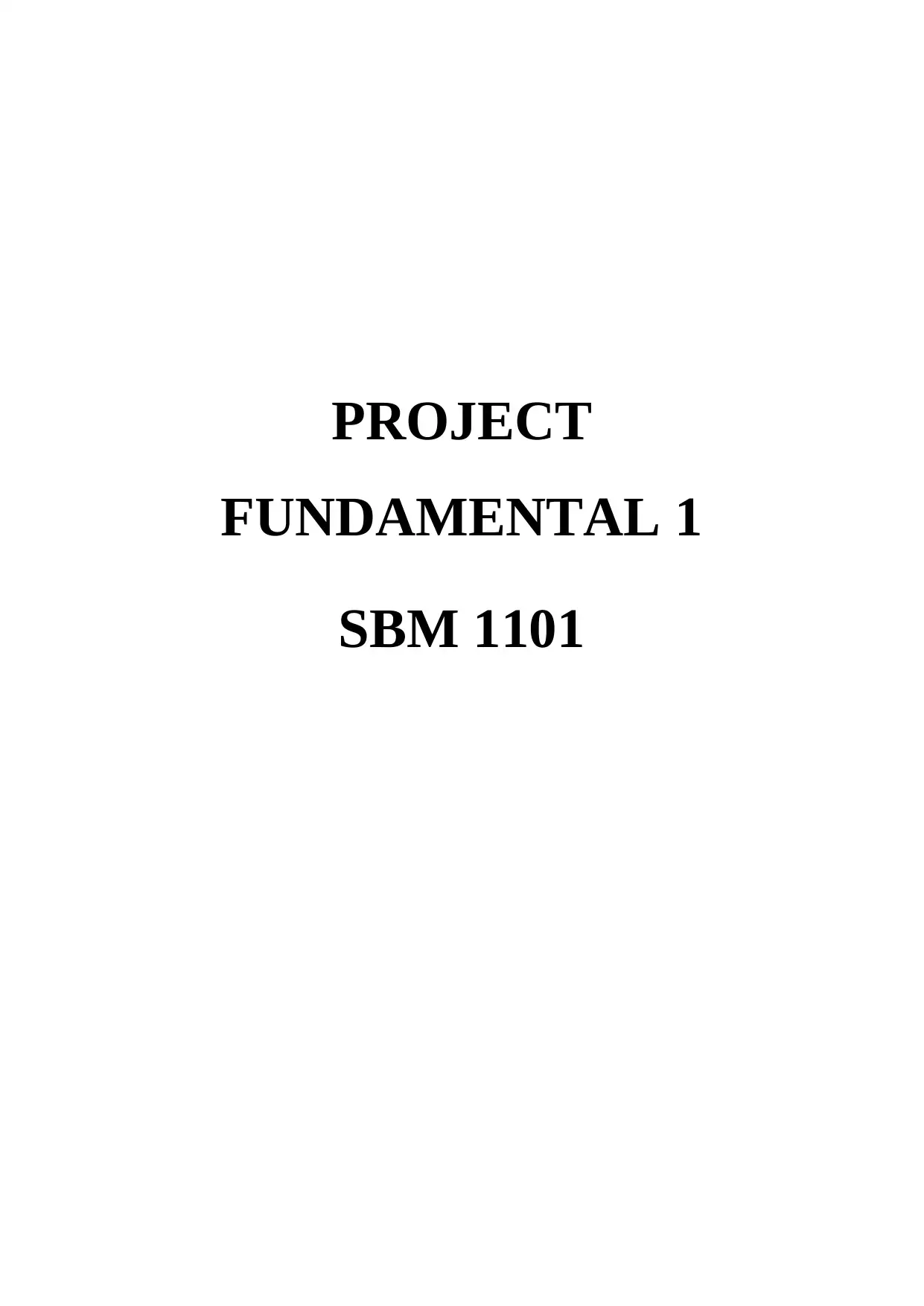
PROJECT
FUNDAMENTAL 1
SBM 1101
FUNDAMENTAL 1
SBM 1101
Paraphrase This Document
Need a fresh take? Get an instant paraphrase of this document with our AI Paraphraser
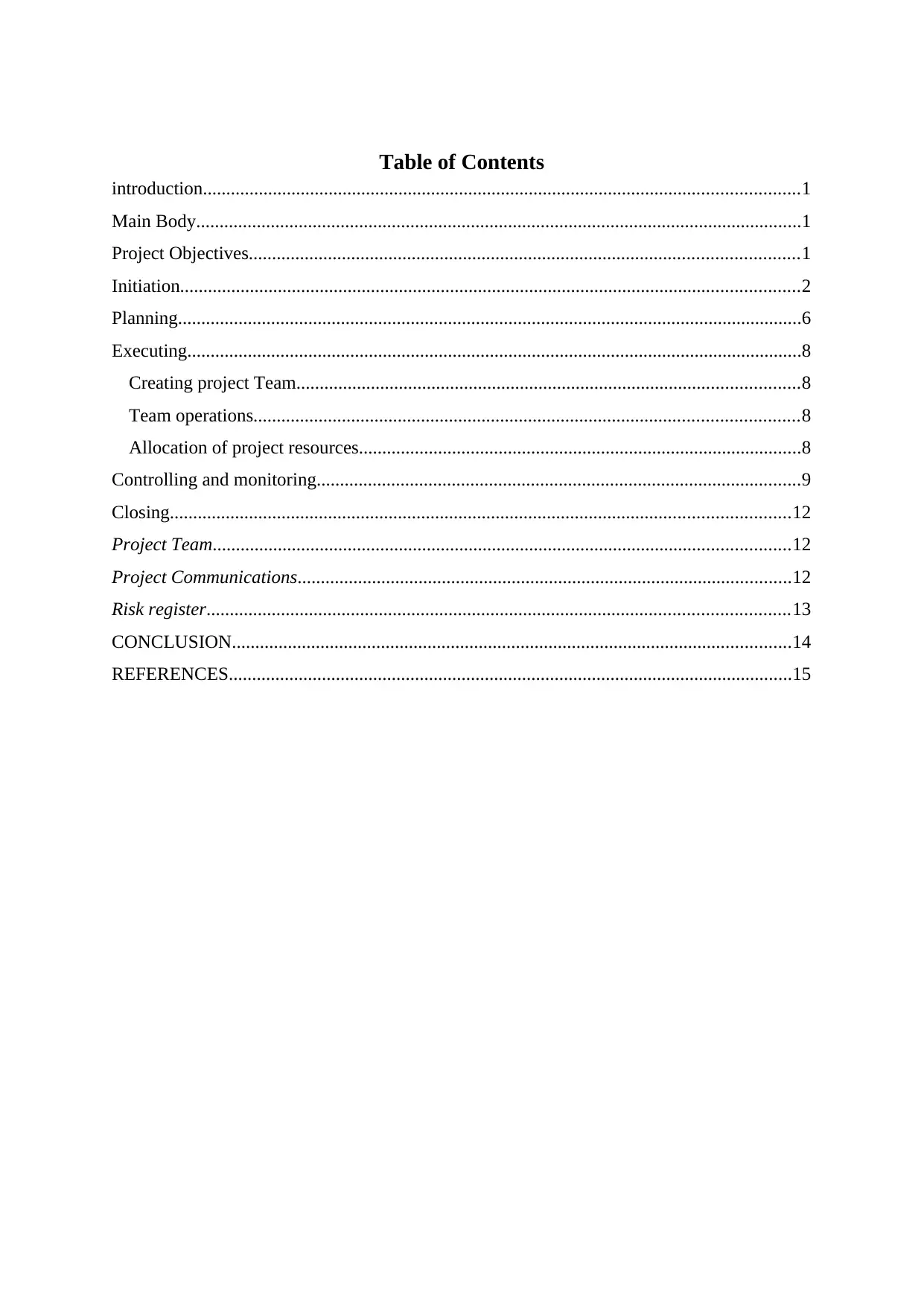
Table of Contents
introduction................................................................................................................................1
Main Body..................................................................................................................................1
Project Objectives......................................................................................................................1
Initiation.....................................................................................................................................2
Planning......................................................................................................................................6
Executing....................................................................................................................................8
Creating project Team............................................................................................................8
Team operations.....................................................................................................................8
Allocation of project resources...............................................................................................8
Controlling and monitoring........................................................................................................9
Closing.....................................................................................................................................12
Project Team............................................................................................................................12
Project Communications..........................................................................................................12
Risk register.............................................................................................................................13
CONCLUSION........................................................................................................................14
REFERENCES.........................................................................................................................15
introduction................................................................................................................................1
Main Body..................................................................................................................................1
Project Objectives......................................................................................................................1
Initiation.....................................................................................................................................2
Planning......................................................................................................................................6
Executing....................................................................................................................................8
Creating project Team............................................................................................................8
Team operations.....................................................................................................................8
Allocation of project resources...............................................................................................8
Controlling and monitoring........................................................................................................9
Closing.....................................................................................................................................12
Project Team............................................................................................................................12
Project Communications..........................................................................................................12
Risk register.............................................................................................................................13
CONCLUSION........................................................................................................................14
REFERENCES.........................................................................................................................15
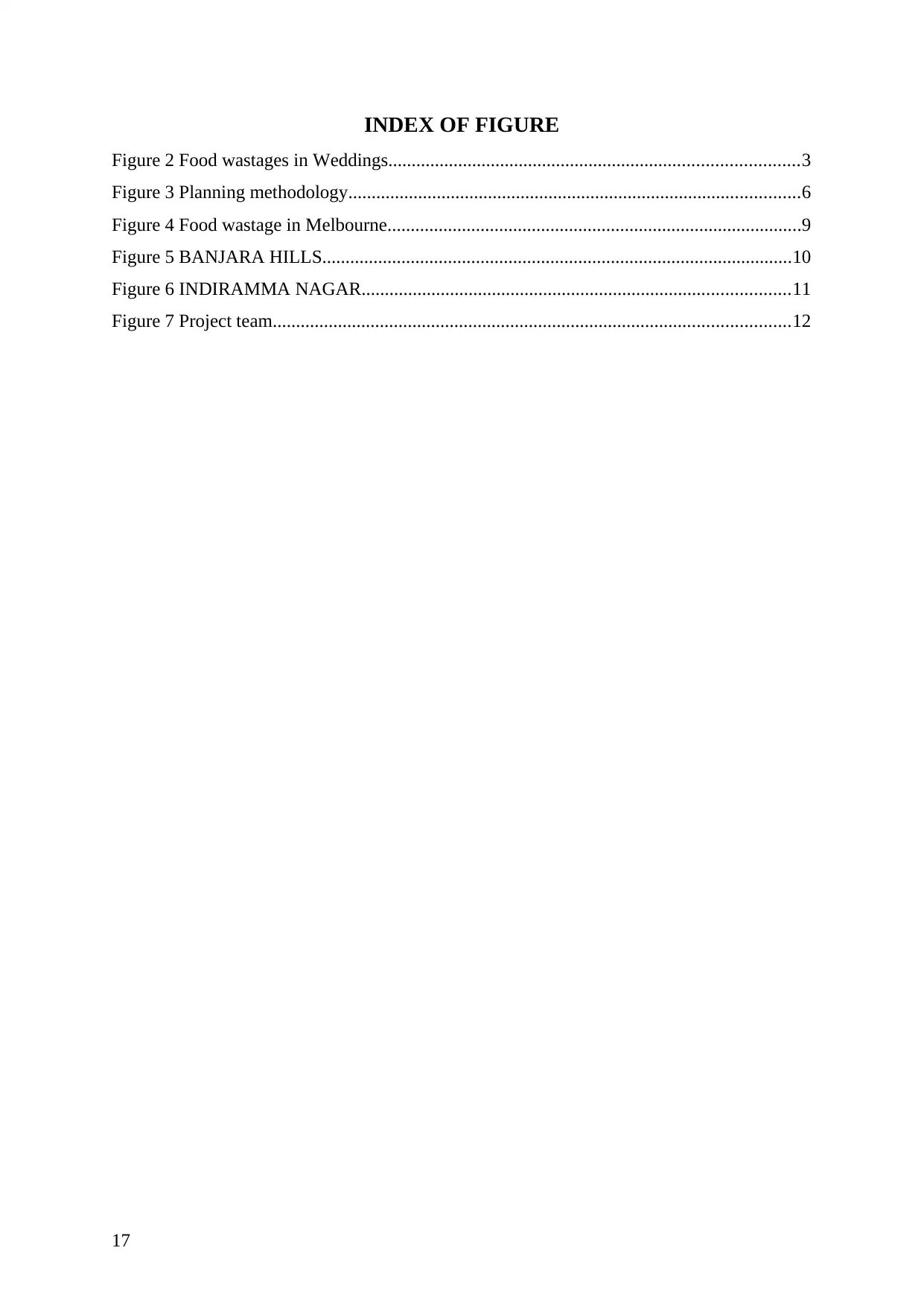
INDEX OF FIGURE
Figure 2 Food wastages in Weddings........................................................................................3
Figure 3 Planning methodology.................................................................................................6
Figure 4 Food wastage in Melbourne.........................................................................................9
Figure 5 BANJARA HILLS.....................................................................................................10
Figure 6 INDIRAMMA NAGAR............................................................................................11
Figure 7 Project team...............................................................................................................12
17
Figure 2 Food wastages in Weddings........................................................................................3
Figure 3 Planning methodology.................................................................................................6
Figure 4 Food wastage in Melbourne.........................................................................................9
Figure 5 BANJARA HILLS.....................................................................................................10
Figure 6 INDIRAMMA NAGAR............................................................................................11
Figure 7 Project team...............................................................................................................12
17
⊘ This is a preview!⊘
Do you want full access?
Subscribe today to unlock all pages.

Trusted by 1+ million students worldwide
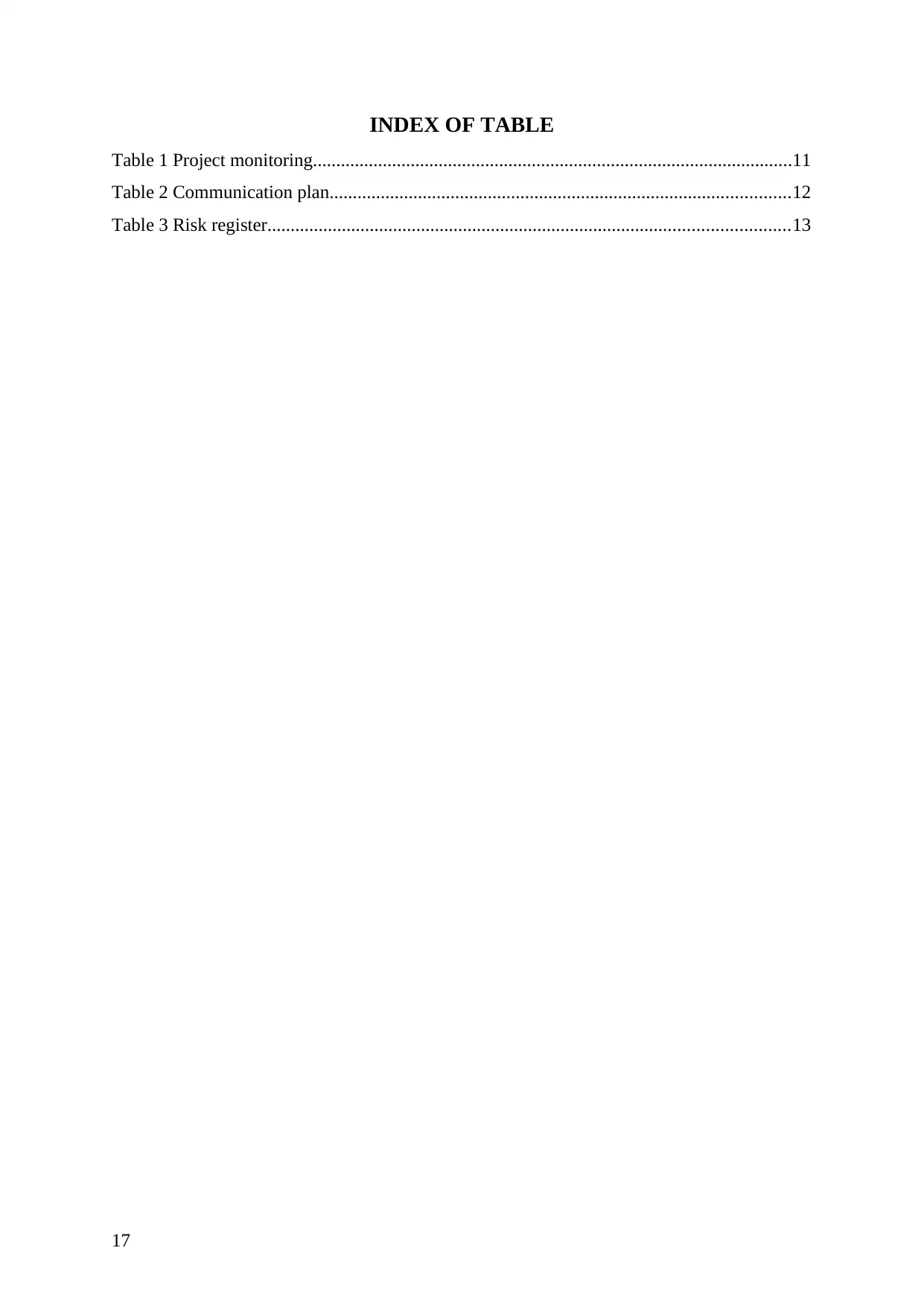
INDEX OF TABLE
Table 1 Project monitoring.......................................................................................................11
Table 2 Communication plan...................................................................................................12
Table 3 Risk register................................................................................................................13
17
Table 1 Project monitoring.......................................................................................................11
Table 2 Communication plan...................................................................................................12
Table 3 Risk register................................................................................................................13
17
Paraphrase This Document
Need a fresh take? Get an instant paraphrase of this document with our AI Paraphraser
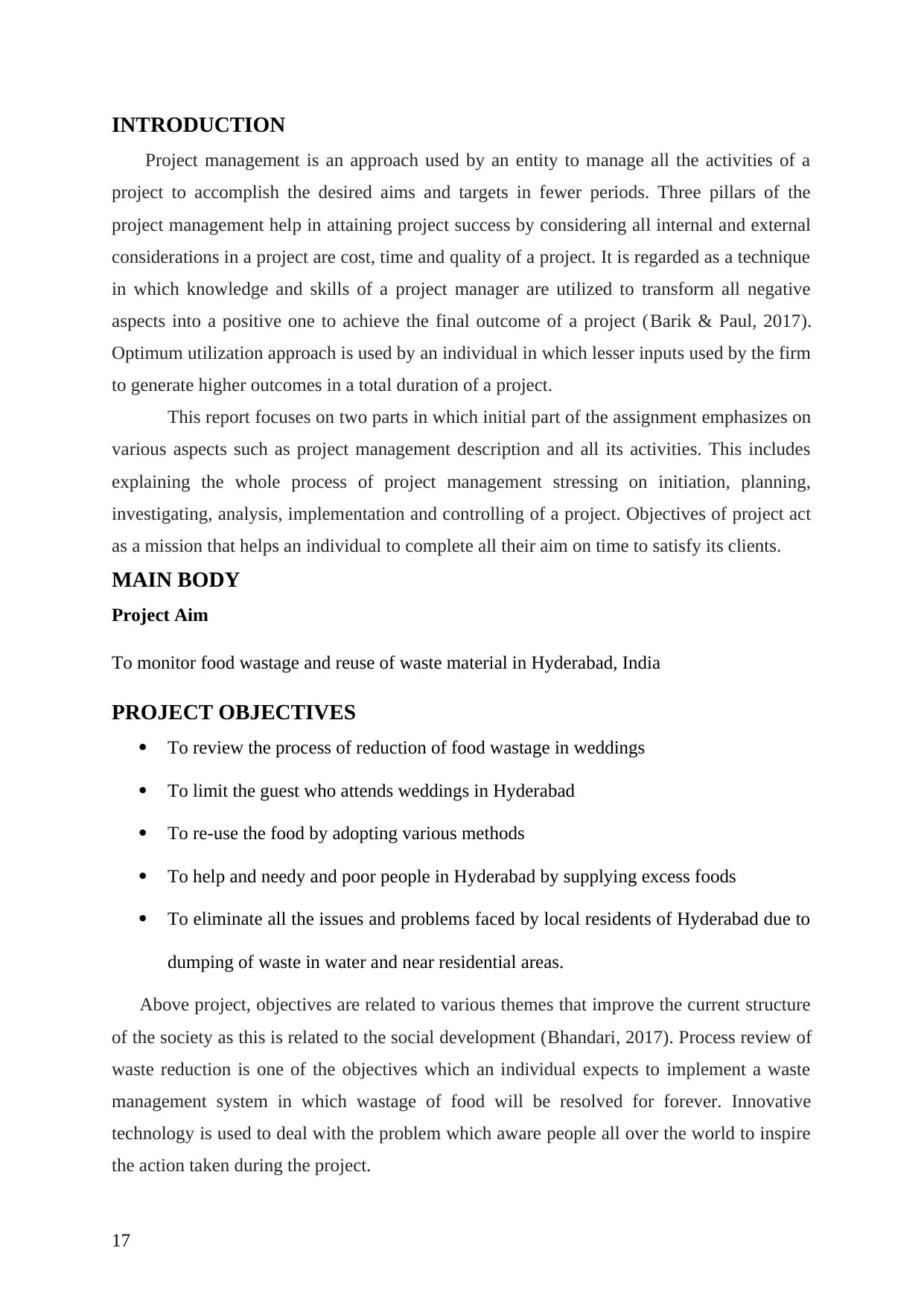
INTRODUCTION
Project management is an approach used by an entity to manage all the activities of a
project to accomplish the desired aims and targets in fewer periods. Three pillars of the
project management help in attaining project success by considering all internal and external
considerations in a project are cost, time and quality of a project. It is regarded as a technique
in which knowledge and skills of a project manager are utilized to transform all negative
aspects into a positive one to achieve the final outcome of a project (Barik & Paul, 2017).
Optimum utilization approach is used by an individual in which lesser inputs used by the firm
to generate higher outcomes in a total duration of a project.
This report focuses on two parts in which initial part of the assignment emphasizes on
various aspects such as project management description and all its activities. This includes
explaining the whole process of project management stressing on initiation, planning,
investigating, analysis, implementation and controlling of a project. Objectives of project act
as a mission that helps an individual to complete all their aim on time to satisfy its clients.
MAIN BODY
Project Aim
To monitor food wastage and reuse of waste material in Hyderabad, India
PROJECT OBJECTIVES
To review the process of reduction of food wastage in weddings
To limit the guest who attends weddings in Hyderabad
To re-use the food by adopting various methods
To help and needy and poor people in Hyderabad by supplying excess foods
To eliminate all the issues and problems faced by local residents of Hyderabad due to
dumping of waste in water and near residential areas.
Above project, objectives are related to various themes that improve the current structure
of the society as this is related to the social development (Bhandari, 2017). Process review of
waste reduction is one of the objectives which an individual expects to implement a waste
management system in which wastage of food will be resolved for forever. Innovative
technology is used to deal with the problem which aware people all over the world to inspire
the action taken during the project.
17
Project management is an approach used by an entity to manage all the activities of a
project to accomplish the desired aims and targets in fewer periods. Three pillars of the
project management help in attaining project success by considering all internal and external
considerations in a project are cost, time and quality of a project. It is regarded as a technique
in which knowledge and skills of a project manager are utilized to transform all negative
aspects into a positive one to achieve the final outcome of a project (Barik & Paul, 2017).
Optimum utilization approach is used by an individual in which lesser inputs used by the firm
to generate higher outcomes in a total duration of a project.
This report focuses on two parts in which initial part of the assignment emphasizes on
various aspects such as project management description and all its activities. This includes
explaining the whole process of project management stressing on initiation, planning,
investigating, analysis, implementation and controlling of a project. Objectives of project act
as a mission that helps an individual to complete all their aim on time to satisfy its clients.
MAIN BODY
Project Aim
To monitor food wastage and reuse of waste material in Hyderabad, India
PROJECT OBJECTIVES
To review the process of reduction of food wastage in weddings
To limit the guest who attends weddings in Hyderabad
To re-use the food by adopting various methods
To help and needy and poor people in Hyderabad by supplying excess foods
To eliminate all the issues and problems faced by local residents of Hyderabad due to
dumping of waste in water and near residential areas.
Above project, objectives are related to various themes that improve the current structure
of the society as this is related to the social development (Bhandari, 2017). Process review of
waste reduction is one of the objectives which an individual expects to implement a waste
management system in which wastage of food will be resolved for forever. Innovative
technology is used to deal with the problem which aware people all over the world to inspire
the action taken during the project.
17
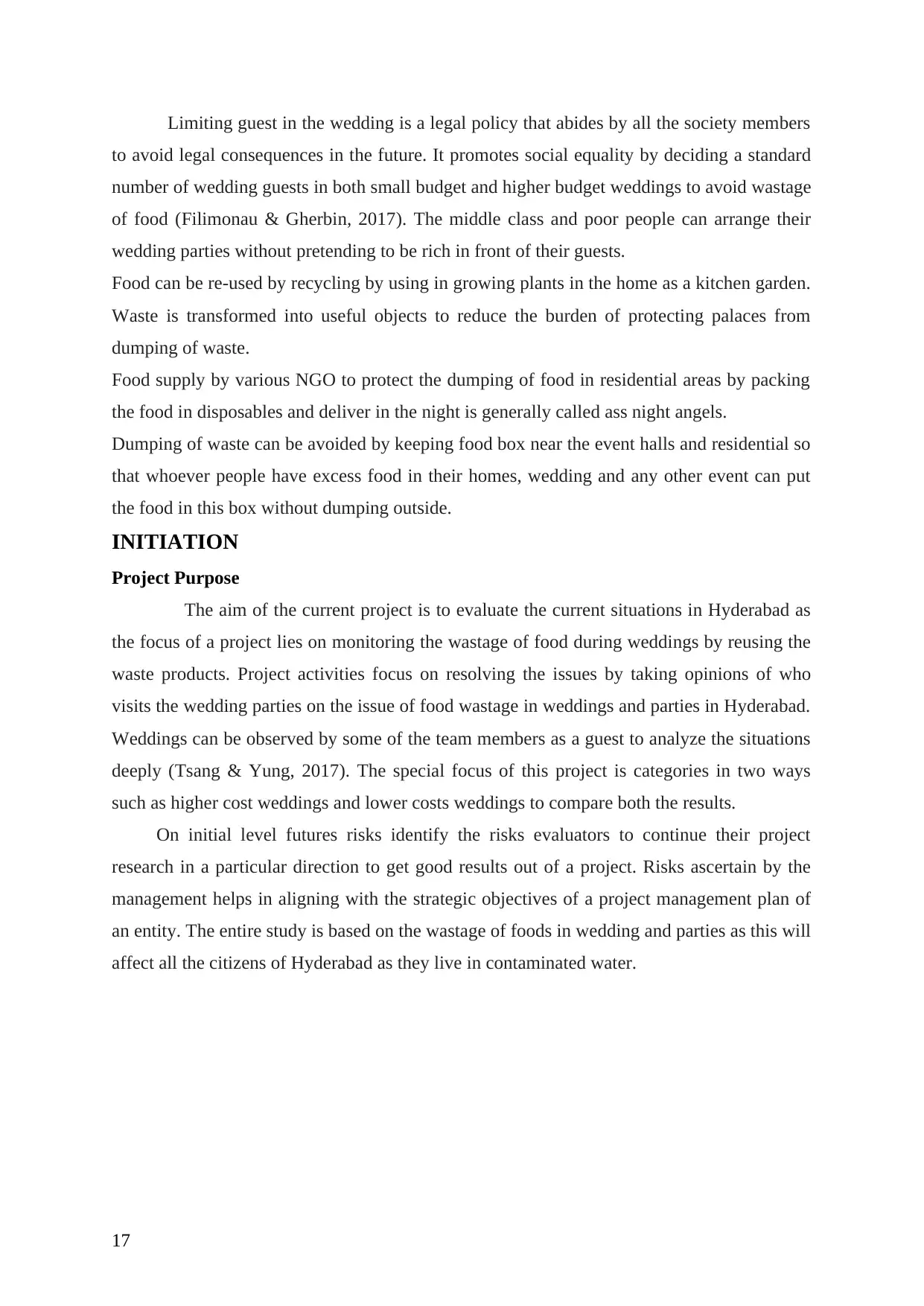
Limiting guest in the wedding is a legal policy that abides by all the society members
to avoid legal consequences in the future. It promotes social equality by deciding a standard
number of wedding guests in both small budget and higher budget weddings to avoid wastage
of food (Filimonau & Gherbin, 2017). The middle class and poor people can arrange their
wedding parties without pretending to be rich in front of their guests.
Food can be re-used by recycling by using in growing plants in the home as a kitchen garden.
Waste is transformed into useful objects to reduce the burden of protecting palaces from
dumping of waste.
Food supply by various NGO to protect the dumping of food in residential areas by packing
the food in disposables and deliver in the night is generally called ass night angels.
Dumping of waste can be avoided by keeping food box near the event halls and residential so
that whoever people have excess food in their homes, wedding and any other event can put
the food in this box without dumping outside.
INITIATION
Project Purpose
The aim of the current project is to evaluate the current situations in Hyderabad as
the focus of a project lies on monitoring the wastage of food during weddings by reusing the
waste products. Project activities focus on resolving the issues by taking opinions of who
visits the wedding parties on the issue of food wastage in weddings and parties in Hyderabad.
Weddings can be observed by some of the team members as a guest to analyze the situations
deeply (Tsang & Yung, 2017). The special focus of this project is categories in two ways
such as higher cost weddings and lower costs weddings to compare both the results.
On initial level futures risks identify the risks evaluators to continue their project
research in a particular direction to get good results out of a project. Risks ascertain by the
management helps in aligning with the strategic objectives of a project management plan of
an entity. The entire study is based on the wastage of foods in wedding and parties as this will
affect all the citizens of Hyderabad as they live in contaminated water.
17
to avoid legal consequences in the future. It promotes social equality by deciding a standard
number of wedding guests in both small budget and higher budget weddings to avoid wastage
of food (Filimonau & Gherbin, 2017). The middle class and poor people can arrange their
wedding parties without pretending to be rich in front of their guests.
Food can be re-used by recycling by using in growing plants in the home as a kitchen garden.
Waste is transformed into useful objects to reduce the burden of protecting palaces from
dumping of waste.
Food supply by various NGO to protect the dumping of food in residential areas by packing
the food in disposables and deliver in the night is generally called ass night angels.
Dumping of waste can be avoided by keeping food box near the event halls and residential so
that whoever people have excess food in their homes, wedding and any other event can put
the food in this box without dumping outside.
INITIATION
Project Purpose
The aim of the current project is to evaluate the current situations in Hyderabad as
the focus of a project lies on monitoring the wastage of food during weddings by reusing the
waste products. Project activities focus on resolving the issues by taking opinions of who
visits the wedding parties on the issue of food wastage in weddings and parties in Hyderabad.
Weddings can be observed by some of the team members as a guest to analyze the situations
deeply (Tsang & Yung, 2017). The special focus of this project is categories in two ways
such as higher cost weddings and lower costs weddings to compare both the results.
On initial level futures risks identify the risks evaluators to continue their project
research in a particular direction to get good results out of a project. Risks ascertain by the
management helps in aligning with the strategic objectives of a project management plan of
an entity. The entire study is based on the wastage of foods in wedding and parties as this will
affect all the citizens of Hyderabad as they live in contaminated water.
17
⊘ This is a preview!⊘
Do you want full access?
Subscribe today to unlock all pages.

Trusted by 1+ million students worldwide
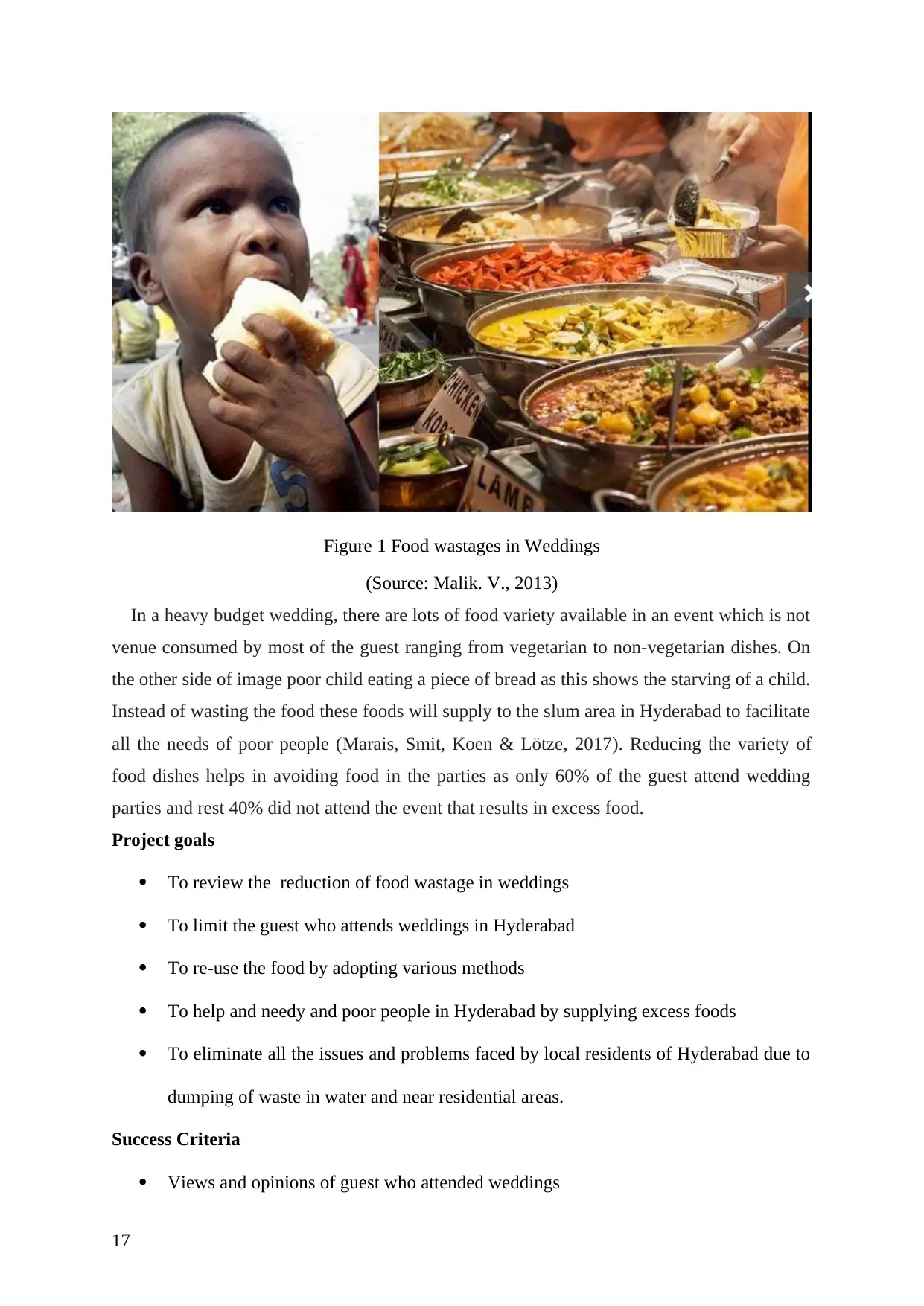
Figure 1 Food wastages in Weddings
(Source: Malik. V., 2013)
In a heavy budget wedding, there are lots of food variety available in an event which is not
venue consumed by most of the guest ranging from vegetarian to non-vegetarian dishes. On
the other side of image poor child eating a piece of bread as this shows the starving of a child.
Instead of wasting the food these foods will supply to the slum area in Hyderabad to facilitate
all the needs of poor people (Marais, Smit, Koen & Lötze, 2017). Reducing the variety of
food dishes helps in avoiding food in the parties as only 60% of the guest attend wedding
parties and rest 40% did not attend the event that results in excess food.
Project goals
To review the reduction of food wastage in weddings
To limit the guest who attends weddings in Hyderabad
To re-use the food by adopting various methods
To help and needy and poor people in Hyderabad by supplying excess foods
To eliminate all the issues and problems faced by local residents of Hyderabad due to
dumping of waste in water and near residential areas.
Success Criteria
Views and opinions of guest who attended weddings
17
(Source: Malik. V., 2013)
In a heavy budget wedding, there are lots of food variety available in an event which is not
venue consumed by most of the guest ranging from vegetarian to non-vegetarian dishes. On
the other side of image poor child eating a piece of bread as this shows the starving of a child.
Instead of wasting the food these foods will supply to the slum area in Hyderabad to facilitate
all the needs of poor people (Marais, Smit, Koen & Lötze, 2017). Reducing the variety of
food dishes helps in avoiding food in the parties as only 60% of the guest attend wedding
parties and rest 40% did not attend the event that results in excess food.
Project goals
To review the reduction of food wastage in weddings
To limit the guest who attends weddings in Hyderabad
To re-use the food by adopting various methods
To help and needy and poor people in Hyderabad by supplying excess foods
To eliminate all the issues and problems faced by local residents of Hyderabad due to
dumping of waste in water and near residential areas.
Success Criteria
Views and opinions of guest who attended weddings
17
Paraphrase This Document
Need a fresh take? Get an instant paraphrase of this document with our AI Paraphraser
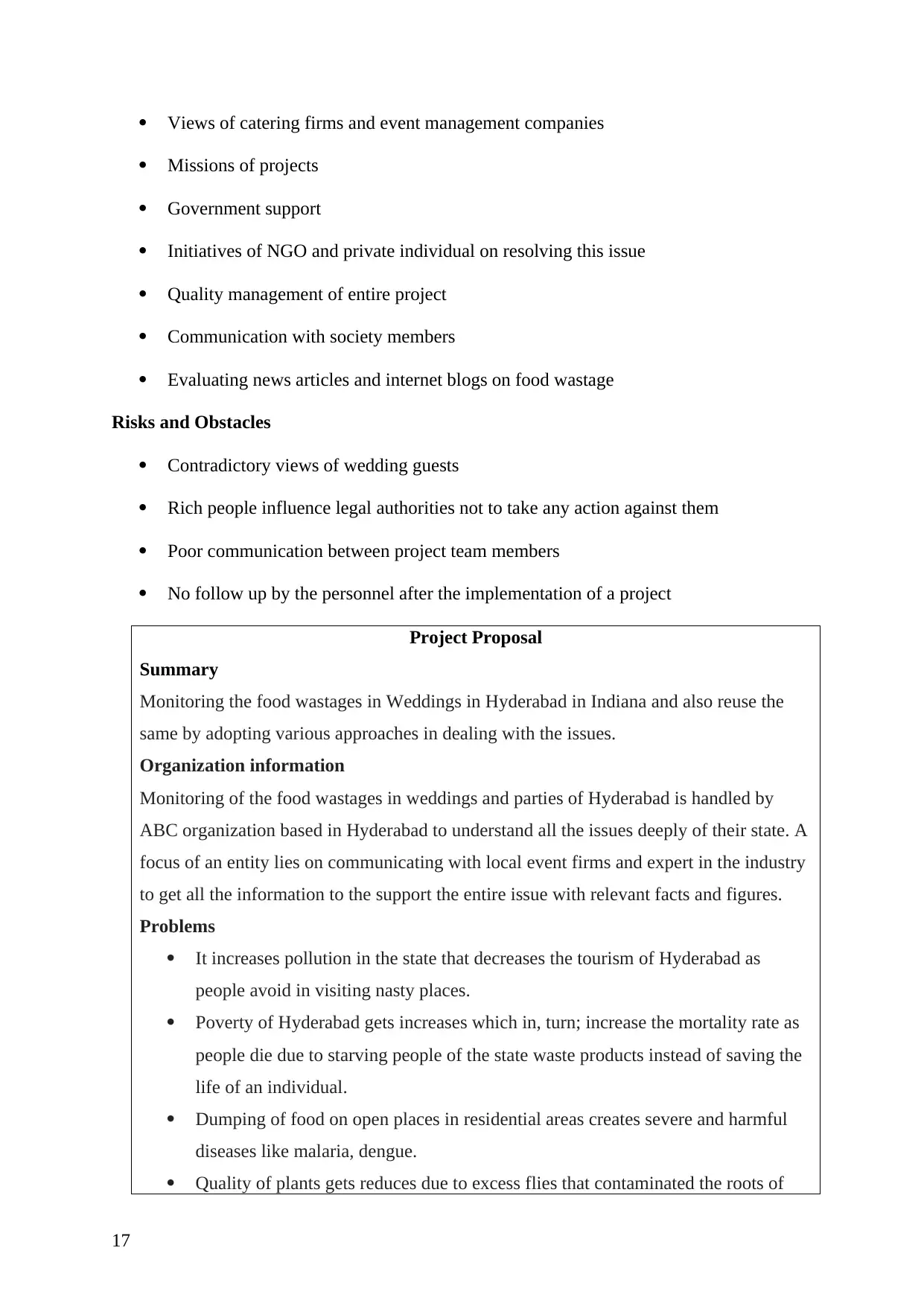
Views of catering firms and event management companies
Missions of projects
Government support
Initiatives of NGO and private individual on resolving this issue
Quality management of entire project
Communication with society members
Evaluating news articles and internet blogs on food wastage
Risks and Obstacles
Contradictory views of wedding guests
Rich people influence legal authorities not to take any action against them
Poor communication between project team members
No follow up by the personnel after the implementation of a project
Project Proposal
Summary
Monitoring the food wastages in Weddings in Hyderabad in Indiana and also reuse the
same by adopting various approaches in dealing with the issues.
Organization information
Monitoring of the food wastages in weddings and parties of Hyderabad is handled by
ABC organization based in Hyderabad to understand all the issues deeply of their state. A
focus of an entity lies on communicating with local event firms and expert in the industry
to get all the information to the support the entire issue with relevant facts and figures.
Problems
It increases pollution in the state that decreases the tourism of Hyderabad as
people avoid in visiting nasty places.
Poverty of Hyderabad gets increases which in, turn; increase the mortality rate as
people die due to starving people of the state waste products instead of saving the
life of an individual.
Dumping of food on open places in residential areas creates severe and harmful
diseases like malaria, dengue.
Quality of plants gets reduces due to excess flies that contaminated the roots of
17
Missions of projects
Government support
Initiatives of NGO and private individual on resolving this issue
Quality management of entire project
Communication with society members
Evaluating news articles and internet blogs on food wastage
Risks and Obstacles
Contradictory views of wedding guests
Rich people influence legal authorities not to take any action against them
Poor communication between project team members
No follow up by the personnel after the implementation of a project
Project Proposal
Summary
Monitoring the food wastages in Weddings in Hyderabad in Indiana and also reuse the
same by adopting various approaches in dealing with the issues.
Organization information
Monitoring of the food wastages in weddings and parties of Hyderabad is handled by
ABC organization based in Hyderabad to understand all the issues deeply of their state. A
focus of an entity lies on communicating with local event firms and expert in the industry
to get all the information to the support the entire issue with relevant facts and figures.
Problems
It increases pollution in the state that decreases the tourism of Hyderabad as
people avoid in visiting nasty places.
Poverty of Hyderabad gets increases which in, turn; increase the mortality rate as
people die due to starving people of the state waste products instead of saving the
life of an individual.
Dumping of food on open places in residential areas creates severe and harmful
diseases like malaria, dengue.
Quality of plants gets reduces due to excess flies that contaminated the roots of
17
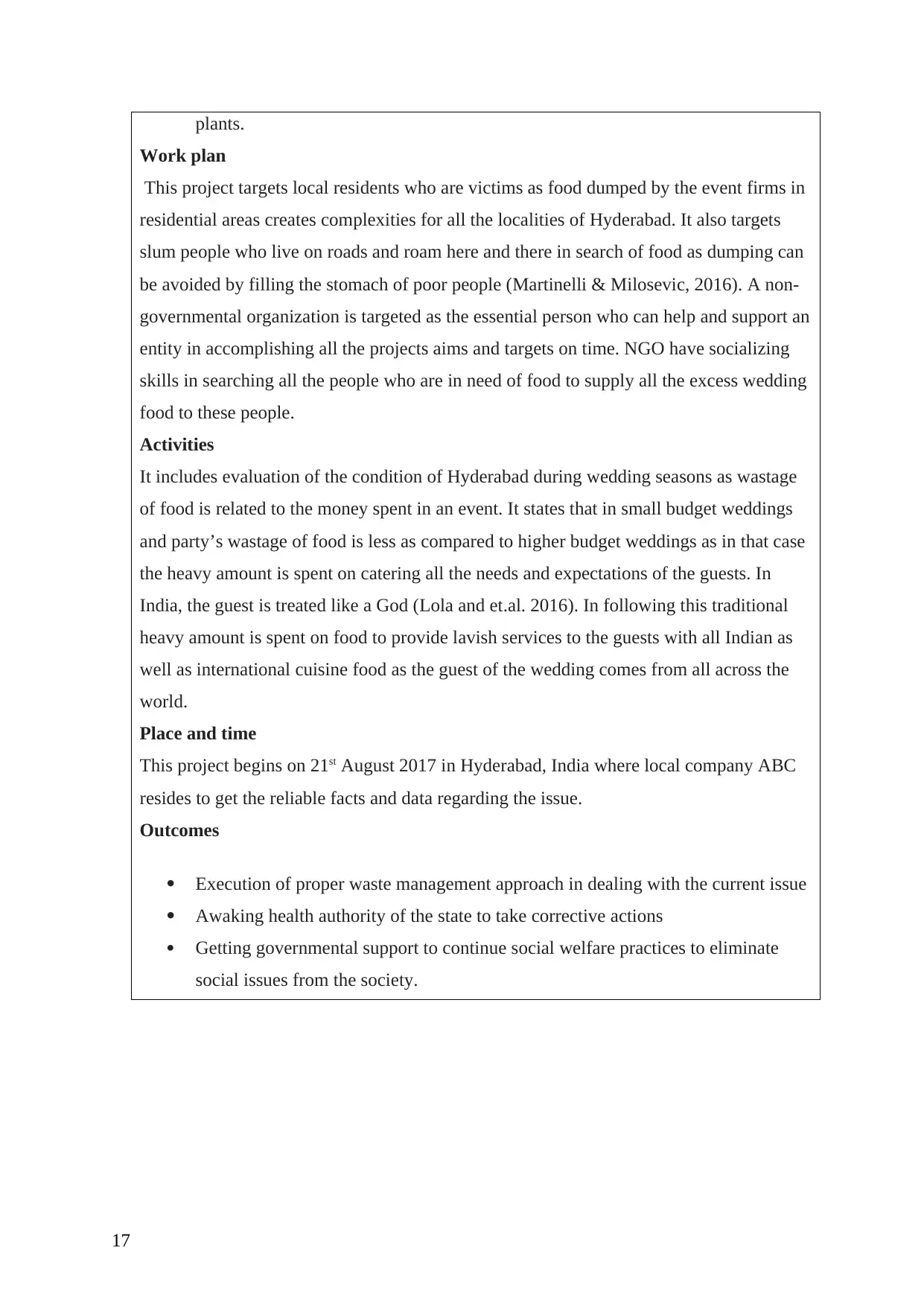
plants.
Work plan
This project targets local residents who are victims as food dumped by the event firms in
residential areas creates complexities for all the localities of Hyderabad. It also targets
slum people who live on roads and roam here and there in search of food as dumping can
be avoided by filling the stomach of poor people (Martinelli & Milosevic, 2016). A non-
governmental organization is targeted as the essential person who can help and support an
entity in accomplishing all the projects aims and targets on time. NGO have socializing
skills in searching all the people who are in need of food to supply all the excess wedding
food to these people.
Activities
It includes evaluation of the condition of Hyderabad during wedding seasons as wastage
of food is related to the money spent in an event. It states that in small budget weddings
and party’s wastage of food is less as compared to higher budget weddings as in that case
the heavy amount is spent on catering all the needs and expectations of the guests. In
India, the guest is treated like a God (Lola and et.al. 2016). In following this traditional
heavy amount is spent on food to provide lavish services to the guests with all Indian as
well as international cuisine food as the guest of the wedding comes from all across the
world.
Place and time
This project begins on 21st August 2017 in Hyderabad, India where local company ABC
resides to get the reliable facts and data regarding the issue.
Outcomes
Execution of proper waste management approach in dealing with the current issue
Awaking health authority of the state to take corrective actions
Getting governmental support to continue social welfare practices to eliminate
social issues from the society.
17
Work plan
This project targets local residents who are victims as food dumped by the event firms in
residential areas creates complexities for all the localities of Hyderabad. It also targets
slum people who live on roads and roam here and there in search of food as dumping can
be avoided by filling the stomach of poor people (Martinelli & Milosevic, 2016). A non-
governmental organization is targeted as the essential person who can help and support an
entity in accomplishing all the projects aims and targets on time. NGO have socializing
skills in searching all the people who are in need of food to supply all the excess wedding
food to these people.
Activities
It includes evaluation of the condition of Hyderabad during wedding seasons as wastage
of food is related to the money spent in an event. It states that in small budget weddings
and party’s wastage of food is less as compared to higher budget weddings as in that case
the heavy amount is spent on catering all the needs and expectations of the guests. In
India, the guest is treated like a God (Lola and et.al. 2016). In following this traditional
heavy amount is spent on food to provide lavish services to the guests with all Indian as
well as international cuisine food as the guest of the wedding comes from all across the
world.
Place and time
This project begins on 21st August 2017 in Hyderabad, India where local company ABC
resides to get the reliable facts and data regarding the issue.
Outcomes
Execution of proper waste management approach in dealing with the current issue
Awaking health authority of the state to take corrective actions
Getting governmental support to continue social welfare practices to eliminate
social issues from the society.
17
⊘ This is a preview!⊘
Do you want full access?
Subscribe today to unlock all pages.

Trusted by 1+ million students worldwide
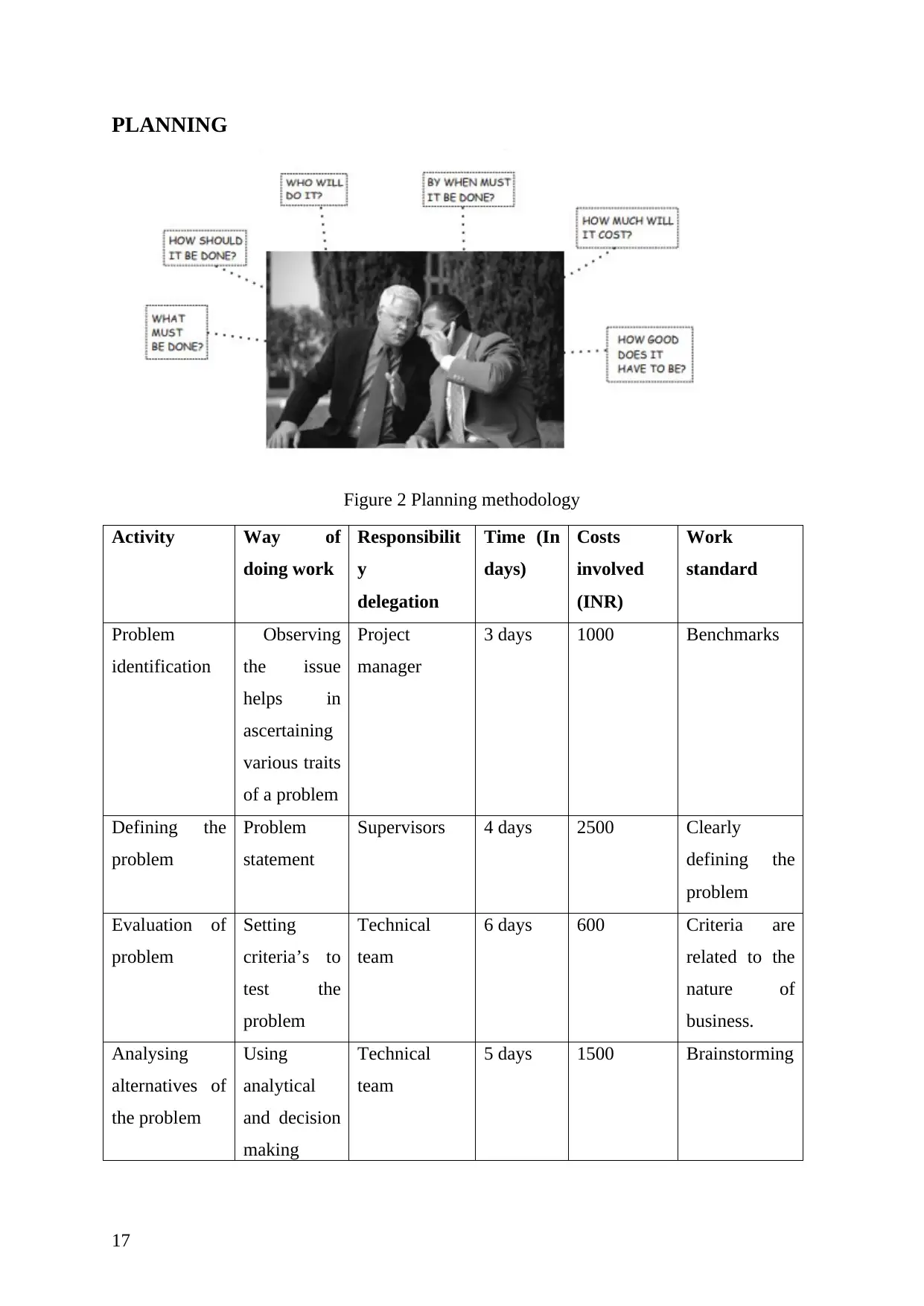
PLANNING
Figure 2 Planning methodology
Activity Way of
doing work
Responsibilit
y
delegation
Time (In
days)
Costs
involved
(INR)
Work
standard
Problem
identification
Observing
the issue
helps in
ascertaining
various traits
of a problem
Project
manager
3 days 1000 Benchmarks
Defining the
problem
Problem
statement
Supervisors 4 days 2500 Clearly
defining the
problem
Evaluation of
problem
Setting
criteria’s to
test the
problem
Technical
team
6 days 600 Criteria are
related to the
nature of
business.
Analysing
alternatives of
the problem
Using
analytical
and decision
making
Technical
team
5 days 1500 Brainstorming
17
Figure 2 Planning methodology
Activity Way of
doing work
Responsibilit
y
delegation
Time (In
days)
Costs
involved
(INR)
Work
standard
Problem
identification
Observing
the issue
helps in
ascertaining
various traits
of a problem
Project
manager
3 days 1000 Benchmarks
Defining the
problem
Problem
statement
Supervisors 4 days 2500 Clearly
defining the
problem
Evaluation of
problem
Setting
criteria’s to
test the
problem
Technical
team
6 days 600 Criteria are
related to the
nature of
business.
Analysing
alternatives of
the problem
Using
analytical
and decision
making
Technical
team
5 days 1500 Brainstorming
17
Paraphrase This Document
Need a fresh take? Get an instant paraphrase of this document with our AI Paraphraser
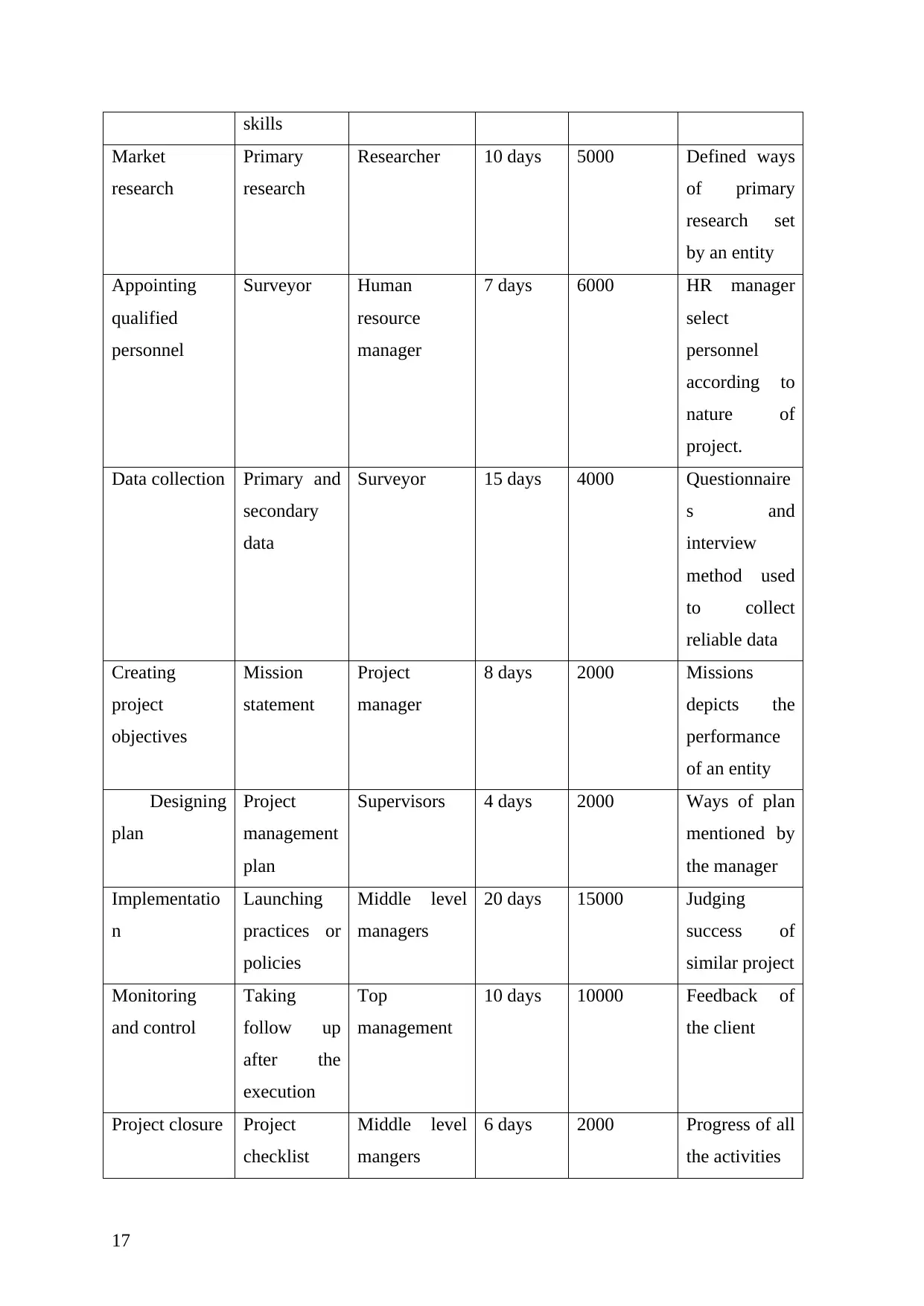
skills
Market
research
Primary
research
Researcher 10 days 5000 Defined ways
of primary
research set
by an entity
Appointing
qualified
personnel
Surveyor Human
resource
manager
7 days 6000 HR manager
select
personnel
according to
nature of
project.
Data collection Primary and
secondary
data
Surveyor 15 days 4000 Questionnaire
s and
interview
method used
to collect
reliable data
Creating
project
objectives
Mission
statement
Project
manager
8 days 2000 Missions
depicts the
performance
of an entity
Designing
plan
Project
management
plan
Supervisors 4 days 2000 Ways of plan
mentioned by
the manager
Implementatio
n
Launching
practices or
policies
Middle level
managers
20 days 15000 Judging
success of
similar project
Monitoring
and control
Taking
follow up
after the
execution
Top
management
10 days 10000 Feedback of
the client
Project closure Project
checklist
Middle level
mangers
6 days 2000 Progress of all
the activities
17
Market
research
Primary
research
Researcher 10 days 5000 Defined ways
of primary
research set
by an entity
Appointing
qualified
personnel
Surveyor Human
resource
manager
7 days 6000 HR manager
select
personnel
according to
nature of
project.
Data collection Primary and
secondary
data
Surveyor 15 days 4000 Questionnaire
s and
interview
method used
to collect
reliable data
Creating
project
objectives
Mission
statement
Project
manager
8 days 2000 Missions
depicts the
performance
of an entity
Designing
plan
Project
management
plan
Supervisors 4 days 2000 Ways of plan
mentioned by
the manager
Implementatio
n
Launching
practices or
policies
Middle level
managers
20 days 15000 Judging
success of
similar project
Monitoring
and control
Taking
follow up
after the
execution
Top
management
10 days 10000 Feedback of
the client
Project closure Project
checklist
Middle level
mangers
6 days 2000 Progress of all
the activities
17
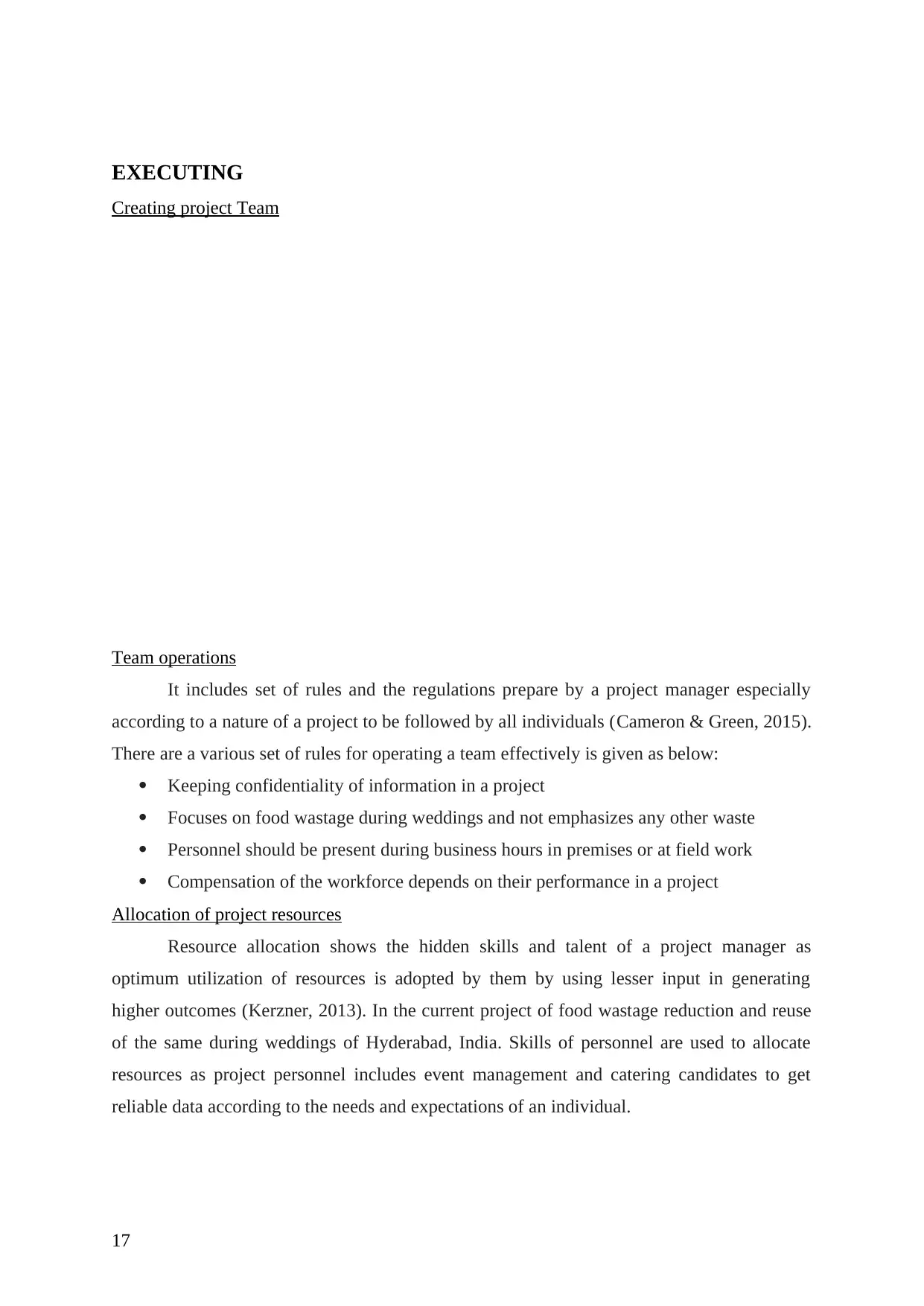
EXECUTING
Creating project Team
Team operations
It includes set of rules and the regulations prepare by a project manager especially
according to a nature of a project to be followed by all individuals (Cameron & Green, 2015).
There are a various set of rules for operating a team effectively is given as below:
Keeping confidentiality of information in a project
Focuses on food wastage during weddings and not emphasizes any other waste
Personnel should be present during business hours in premises or at field work
Compensation of the workforce depends on their performance in a project
Allocation of project resources
Resource allocation shows the hidden skills and talent of a project manager as
optimum utilization of resources is adopted by them by using lesser input in generating
higher outcomes (Kerzner, 2013). In the current project of food wastage reduction and reuse
of the same during weddings of Hyderabad, India. Skills of personnel are used to allocate
resources as project personnel includes event management and catering candidates to get
reliable data according to the needs and expectations of an individual.
17
Supervisor
Creating project Team
Team operations
It includes set of rules and the regulations prepare by a project manager especially
according to a nature of a project to be followed by all individuals (Cameron & Green, 2015).
There are a various set of rules for operating a team effectively is given as below:
Keeping confidentiality of information in a project
Focuses on food wastage during weddings and not emphasizes any other waste
Personnel should be present during business hours in premises or at field work
Compensation of the workforce depends on their performance in a project
Allocation of project resources
Resource allocation shows the hidden skills and talent of a project manager as
optimum utilization of resources is adopted by them by using lesser input in generating
higher outcomes (Kerzner, 2013). In the current project of food wastage reduction and reuse
of the same during weddings of Hyderabad, India. Skills of personnel are used to allocate
resources as project personnel includes event management and catering candidates to get
reliable data according to the needs and expectations of an individual.
17
Supervisor
⊘ This is a preview!⊘
Do you want full access?
Subscribe today to unlock all pages.

Trusted by 1+ million students worldwide
1 out of 19
Related Documents
Your All-in-One AI-Powered Toolkit for Academic Success.
+13062052269
info@desklib.com
Available 24*7 on WhatsApp / Email
![[object Object]](/_next/static/media/star-bottom.7253800d.svg)
Unlock your academic potential
Copyright © 2020–2026 A2Z Services. All Rights Reserved. Developed and managed by ZUCOL.



